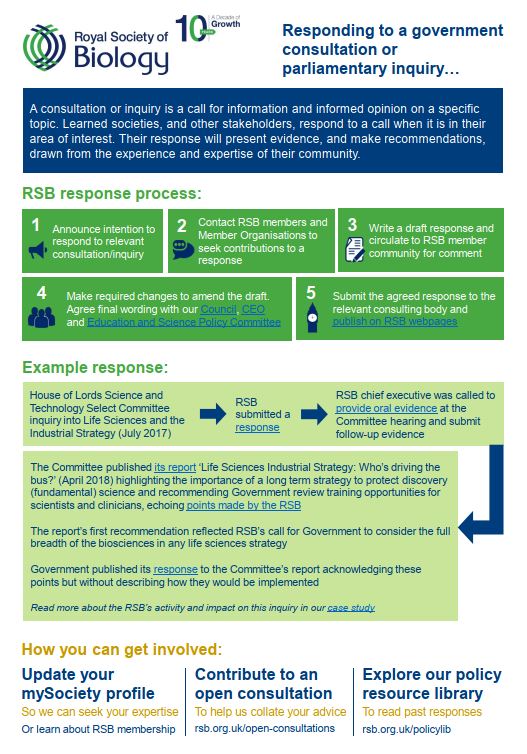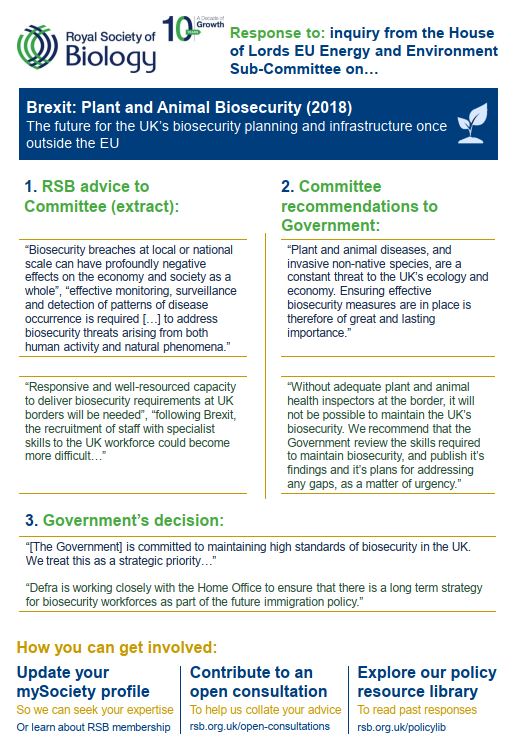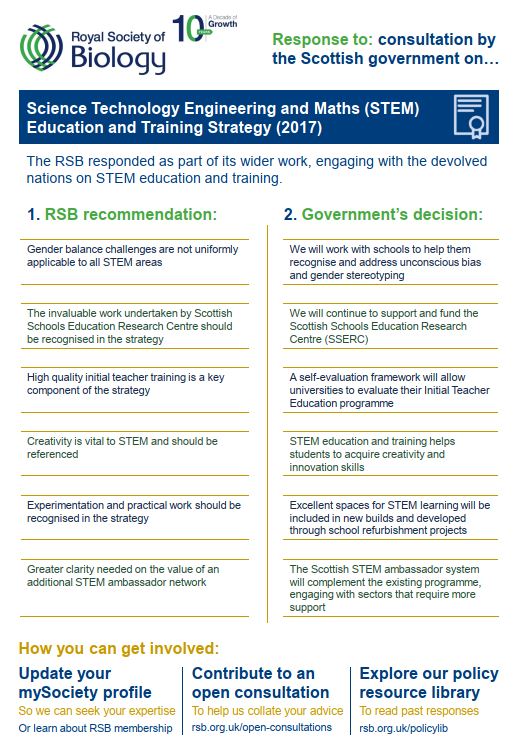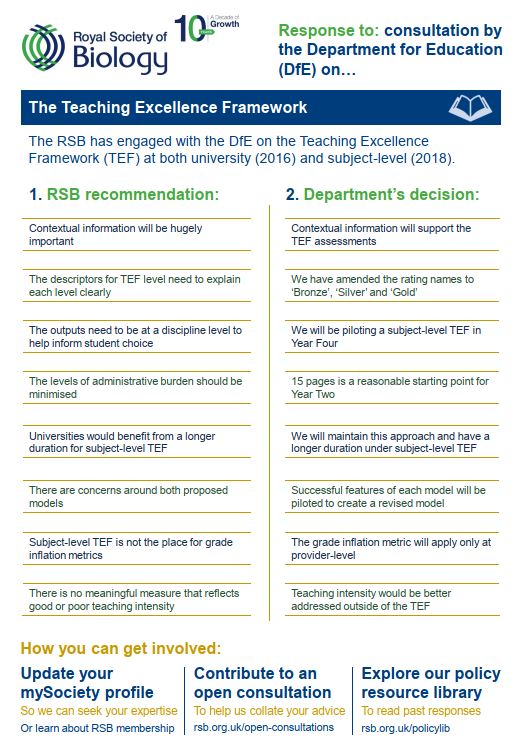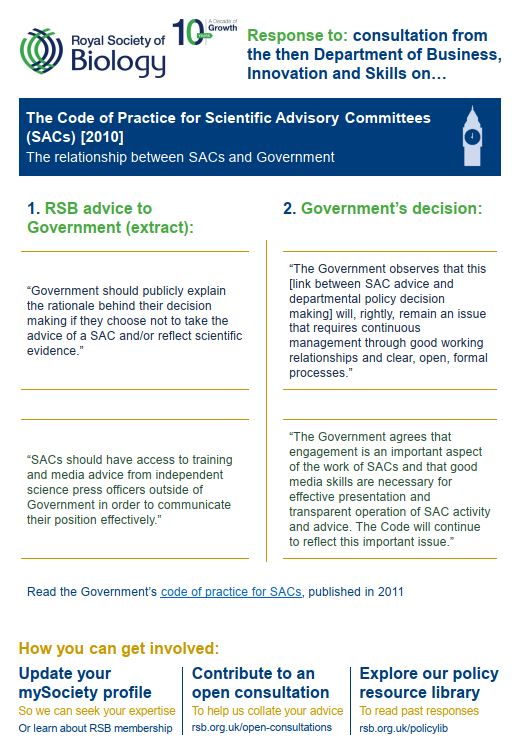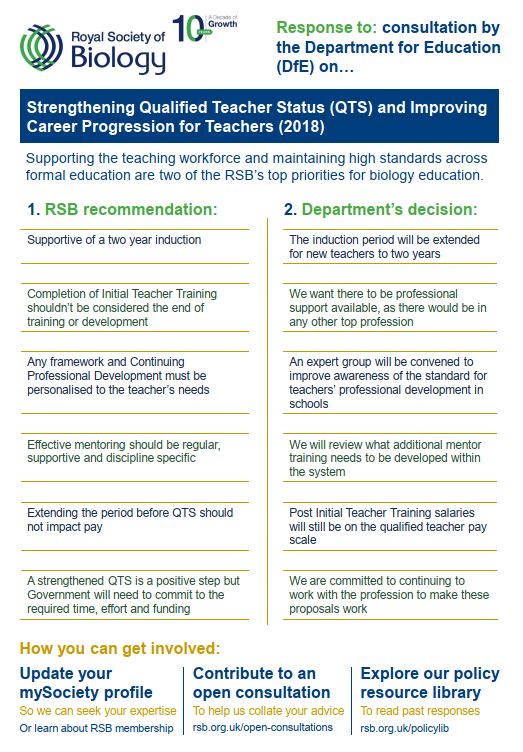Over the past 10 years since 2009, the RSB policy team have produced well over 250 letters, briefing notes, position statements, consultation responses and reports, on a huge range of policy topics, expressing key messages from and for the biosciences. Broadly speaking, the aim of the RSB's policy work is one of knowledge exchange: we collate expert opinion and expertise from our members and present this in a way which is accessible to policy- and decision- makers.
The RSB response process and how you can get involved (pdf):
Previous policy case studies:
The range of topics the RSB policy team has tackled in the last 10 years is a testament to the relevance of biology to so many facets of life, and to the importance of biological knowledge and biology-informed advice – from molecular to planetary matters. Below is a small selection of case studies from our huge body of previous science and education policy work, highlighting our priorities, impact, and role as the unifying voice for biology.
- Brexit: Plant and Animal Biosecurity
- STEM Education and Training Strategy
- The 25-Year Environment Plan
- The Teaching Excellence Framework
- The Code of Practice for Scientific Advisory Committees
- Strengthening QTS and Improving Career Progression for Teachers
Brexit: Plant and Animal Biosecurity (pdf)
Read the full documents: RSB's response, the House of Lords EU Energy and Environment Sub-Committee report, the Government’s published decisions.
This response hits a point of overlap in two major areas of RSB science policy activity to enable knowledge exchange and inform policy and decision makers, and our community about:
- The evidence base and research, infrastructure, contingency and community need related to UK biosecurity planning, policy and practice in a global context. This forms a specific priority for us and includes our work on UK control measures for bovine TB; dual use research of concern; projects in collaboration with Defra to support expertise in plant health (such as our Plant Health Undergraduate Studentships); and our recent work in response to the COVID-19 pandemic.
- Ongoing community need and the implications of Brexit for the biosciences, STEM and society. This features across several of our Science Policy Priorities including our work on research funding, culture and infrastructure, and related activities such as previous consultation responses on the UK immigration system and frameworks for international collaboration on research and innovation.
STEM Education and Training Strategy (pdf)
Read the full documents: RSB's recommendation, the Government response.
This response forms part of our wider work, engaging with the devolved nations on STEM education and training. RSB submitted an individual response to the draft STEM education and training strategy as well as contributing to a joint Learned Societies Group response. The Society has also supported STEM education across the nations by providing input and feedback on the Curriculum for Wales 2022 and is developing a biology curriculum framework for ages 5-19, that will inform future UK curriculum developments.
The 25-Year Environment Plan (pdf)
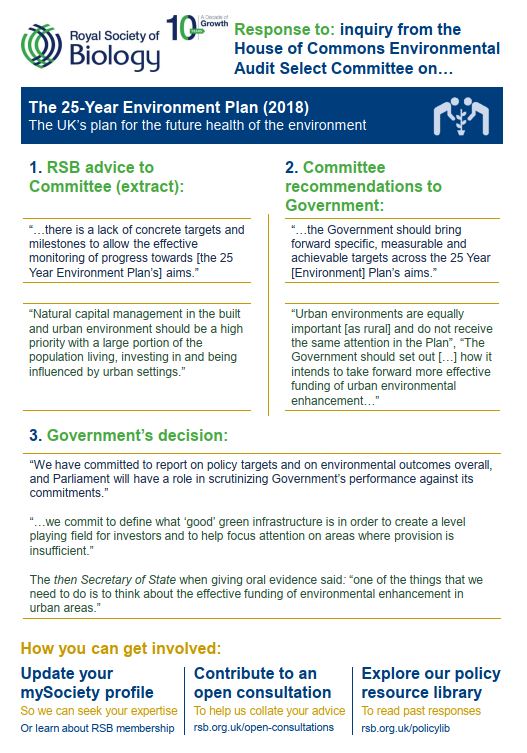
Read the full documents: RSB's response, the House of Commons Environmental Audit Select Committee report, the Government’s published decisions.
Another specific priority for our work is Environmental policy. We focus on enabling knowledge exchange to inform sustainable ecosystem management, and resource use, in the current context of the climate and ecosystem emergencies. Our work in this area includes previous responses to other consultations on subjects such as clean air, environmental principles and governance, and the economics of biodiversity; workshops and reports produced by our special interest group the Natural Capital Initiative, and engagement with Government and other learned societies for example in preparation for COP26.
The Teaching Excellence Framework (pdf)
Read the full documents: RSB's recommendation, the Department for Education response.
The Society has engaged with the Department for Education, Department for Business, Innovation and Skills and Office for Students on the Teaching Excellence Framework (TEF) at university and subject-level. While we support the overarching aims to raise the status and standard of teaching and provide better support for teachers in higher education, we have raised specific concerns throughout the government’s consultation periods. RSB responses to TEF Year 2 technical consultation, Higher Education Teaching Excellence, social mobility and student choice green paper and subject-level pilot specification are available online, in addition we provided informal feedback on subject-level straw men and pilot through roundtable discussions.
The Code of Practice for Scientific Advisory Committees (pdf)
Read the full documents: RSB's response, the Government’s published decisions.
Exploring and strengthening the role and mechanisms for implementation of scientific advice to guide policy making remains central to what we do, across all our strategic priority areas. Our primary aim is to enable knowledge exchange within and between diverse communities and sectors, including scientists and policy makers, to enable evidence based decision-making. We provide this voice for the biosciences by collating community advice into our responses to consultations and inquiries; by facilitating the work of groups and committees, and producing events and workshops as a platform for discussion; and by working with other organisations in our member community and beyond, such as the Science Media Centre (SMC), to provide opportunities for scientific experts to engage effectively with policy makers and members of the public. For example, we facilitate frequent engagement between the UK Bioscience Sector Coalition and the Home Office Animals in Science Regulation Unit (ASRU), and their work, including support to expert members of the research community giving public media briefings.
Strengthening QTS and Improving Career Progression for Teachers (pdf)
Read the full documents: RSB's recommendation, the Department for Education response.
Supporting the teaching workforce and maintaining high standards across formal education are two of the Society’s top priorities for biology education. As well as responding to the QTS consultation, the RSB added our support to a letter signed by several organisations, urging the Department for Education to consider the importance of subject-specific mentoring and professional development in the implementation of the early career framework. A similar joint submission approach on support for teaching is taken across the nations, as part of the Learned Societies Group to the General Teaching Council Scotland and with other societies to the Migration Advisory Committee.
Download the full set of our education and science policy case studies.
The special anniversary edition of our popular bi-monthly membership magazine, The Biologist features an exclusive piece reflecting on 10 years of the RSB's work in UK science and education policy.
To contact the RSB's policy team, email This email address is being protected from spambots. You need JavaScript enabled to view it.


